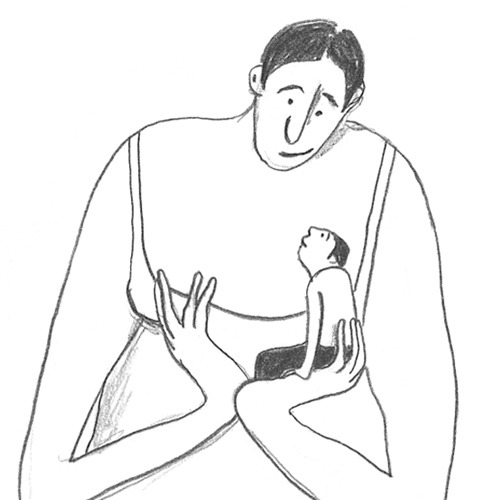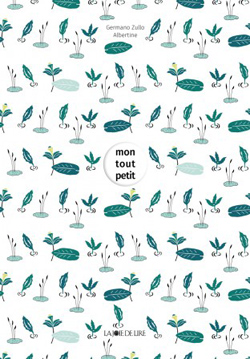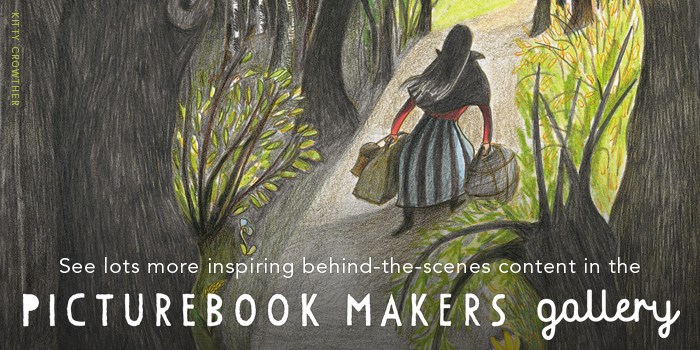< Back to posts
Germano Zullo & Albertine
Switzerland

Germano Zullo studied economics and management before becoming a prolific author. Albertine's illustration career began after graduating from art school in Geneva. The couple marrried in 1996 and have since collaborated on many books and won awards such as a Biennial of Illustration Bratislava Golden Apple and a Bologna Ragazzi Award.
In this post, Germano and Albertine talk about their profound and beautifully illustrated picturebook, ‘Mon tout petit’ (My little one), which is published by Éditions La Joie de lire, and won the 2016 Bologna Ragazzi Award in the ‘Fiction’ category.
Germano: Ever since Albertine and I first met in 1992, we have always strived to establish a dialogue. A dialogue may appear to many as obvious. But it is not. Most of the time, people do not have a dialogue; they have a monologue. One of the hardest things in the world is to know how to listen to each other. Knowing how to listen to each other is difficult because it involves the notion of self-criticism. But we need to face the facts: once our ego is put in its place, the possibilities of existence are much more interesting and rich. It is therefore out of the question for us, in any of our collaborations, that the muses of one of us interfere with the muses of the other. A book is always, first and foremost, the fruit of a dialogue between text and image.
The idea behind ‘Mon tout petit’ (My little one) comes from a feeling I have about my father. As he grows older, his mind seems to infiltrate my body. It is not uncommon in Southern Italy that men keep their inner selves a secret; their past is often vague, improbable and mysterious. Little is told or explained to the next generation. Questions do not find answers, and what needs to be told is left unsaid. The family puzzle is vast and the visible pieces are far too rare.
Despite this fact and simply by permeation, transmission does take place, identities are built and new pieces of the puzzle are generated, quite similar in appearance to the previous ones and left to the passing of time. Whatever our singularity, we carry within us our fathers and thus a great part of the universal narrative.
Albertine: The visual of the book had to evoke this dance of life, from birth to death, while illustrating that wonderful feeling of love. It also had to show empathy and reflect this back to the reader. The simplest things are often the most difficult to achieve and I searched a long time for the right means of expression.
Various techniques were explored: Indian ink, gouache, coloured pencils... Ultimately, the lead pencil emerged as the best means to evoke sensuality in black and white. It evokes a certain amount of spontaneity, just like sketches which blend lightness, fragility and melancholy. One can also find in it the spirit of a previous book of mine, ‘Bimbi’, published by La Joie de lire, which deals with childhood.
The other challenge was to build the choreography of this dance. The movement needed to be continuous, like an animated film or a flick book, and a balance between the proportions of the character growing up and the other growing smaller as the story unfolds would somehow mark as a metronome for the rhythm of the sequence. The lightbox proved essential for this operation.
To serve the narrative and to emphasise the universality of the story, simplicity quickly appeared obvious. The mother holds a monologue in which she expresses her love for her son. She wants to tell him everything, teach him everything. But although this impulse is irresistible, the amount of energy and time required to transmit all this knowledge is insufficient. The mother disappears and only her intentions seem to have been bequeathed to her son. The latter, when he becomes a man, appears nevertheless to have acquired an immense knowledge. He displays a wise maturity which he is ready, in turn, to pass on.
Finally, ‘Mon tout petit’ is the result of two other books dealing with transmission: ‘Les Oiseaux’ (The Birds) and ‘Ligne 135’ (Line 135).
The three books can be read as a trilogy on a theme which we have not yet finished exploring. It is essential for us to continue, as much for its beauty as for its mystery.
Illustrations © Albertine. Post translated by Gengo and edited by dPICTUS.
Mon tout petit /
My little one
Germano Zullo & Albertine
Éditions La Joie de lire, Switzerland, 2015
‘This is a book about love, the passing of time, and the cycle of our lives. It is also about relationships. Slowly, page after page, the sparse black pencil illustrations on milky white paper tell a restrained, eloquently poetic universal story.’
—The Bologna Ragazzi Award Jury















